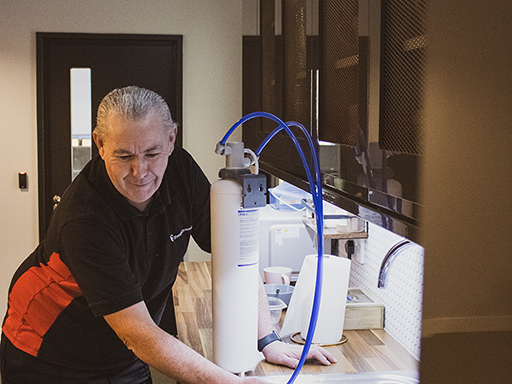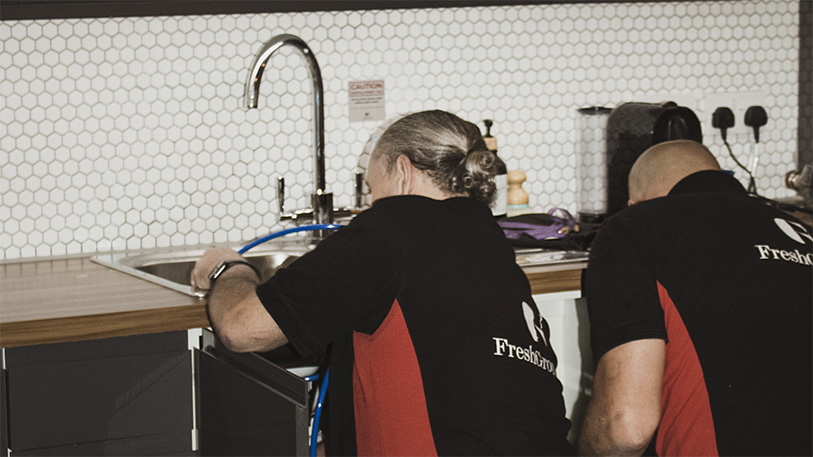Commercial coffee machine service plans for offices: Pros and cons explained
Lily Hedley | July 28, 2025 | 6 minute read

Reliable coffee machine servicing is important for any office using self service commercial coffee machines.
When a machine breaks down, it disrupts the workday and frustrates staff. Many businesses choose a service plan to keep their machines working and reduce unexpected downtime.
But is a service plan the best option for your office? This article explains the pros and cons so you can make an informed decision.
At a glance
Here are the pros and cons of having a coffee machine service plan, laid out for you in a handy table.
| Pro | Con |
|---|---|
| Predictable monthly or annual payments make budgeting easier | Can be more expensive than ad-hoc support for light-use teams |
| Quick access to repairs and servicing reduces downtime | Coverage levels vary between providers and may be limited |
| Regular maintenance helps machines last longer and perform better | May overlap with existing manufacturer warranties |
| Scheduled descaling and filter changes protect against hard water damage | Not always necessary in soft water areas or low-use offices |
| Cleaning and checks maintain safe drinking water standards | Some businesses may already manage hygiene effectively in-house |
What is a service plan?
A service plan is a scheduled maintenance and support agreement provided by your equipment supplier or a third party. It typically includes:
- Routine servicing at fixed intervals
- Access to breakdown support
- Replacement parts or loan units
- Emergency callouts or next-day engineer visits
Service plans are designed to keep equipment running smoothly and reduce unexpected costs or disruptions.

Pro: Predictable costs
With a service plan, your maintenance costs are spread over time. That is useful for budget planning and financial forecasting. You know exactly what you’re paying and what’s covered. You’re not hit with sudden repair bills or callout fees.
For businesses managing multiple machines or taps, this level of predictability can make cost control much easier.
Searching Google for office coffee machine service or commercial coffee machine service near me will enable you to find reliable local engineers at a fixed cost.
Pro: Less downtime
One of the biggest advantages of a service plan is peace of mind. If a machine breaks down, you’re not left scrambling to find an engineer or replacement parts. You already have someone on call.
For staff, that means less disruption to their coffee. For employers, it helps protect the workplace experience and the value of the investment.
This is especially important for busy offices relying on self service coffee machines where any downtime can affect many people.
Pro: Extend the life of your equipment
Regular servicing helps you get on top of small issues before they become big problems. That means fewer faults, less wear and tear and a longer working life for your machines or taps. It also ensures the system stays hygienic, which is especially important for boiling, chilled or sparkling water units.
According to the British Water Cooler Association, regular maintenance is key to ensuring water systems meet hygiene standards and function efficiently over time.
Pro: Protects against hard water issues
London and Manchester both sit in regions with moderately hard to very hard water. Without regular descaling and filter changes, hard water can build up in the internal components of machines and taps. This reduces performance and leads to more frequent faults.
A service plan makes sure these preventative tasks happen regularly. It may include automatic filter replacements based on usage or time intervals.
Using the right coffee machine servicing can prevent costly damage from hard water and maintain consistent coffee quality.
Con: Not always cost-effective for light use
If your office has one machine serving a team of less than ten people, and you’re using filtered or soft water, then you may not need much support. For these teams, an ad-hoc maintenance approach might be more cost-effective. This is especially true if the machine has a good warranty and is easy to clean.
The key is understanding your usage. High-traffic areas like shared kitchens or coworking spaces will benefit more than a small private office with occasional use.
Con: Coverage can vary
Not all service plans are created equal. Some only include basic servicing. Others cover breakdowns but not consumables. Some require extra fees for emergency visits or parts.
Before signing up, check exactly what is included. Ask about response times, engineer availability and whether parts and labour are covered. It is also worth checking whether the provider handles support in-house or uses a third party.
You want to make sure your coffee machine repair service provider can respond quickly and has access to the parts your machine requires.
Con: You might already be covered
Some equipment comes with a manufacturer’s warranty. These often cover repairs for the first 12 or even 24 months. If that’s the case, paying for a service plan during that time could mean you’re doubling up.
That said, service plans often go further than a standard warranty. They include routine cleaning, descaling and servicing that help prevent issues from happening in the first place.

How to decide?
When deciding if a service plan is right for your office, ask:
- How critical is this machine or tap to our day-to-day operations?
- How many people use it and how often?
- What is the cost difference between ad-hoc repairs and a service plan?
- Are we in a hard water area?
- Is internal cleaning and maintenance being done regularly?
A good supplier will guide you through these questions. They will help you find the best option for your usage rather than offering a one-size-fits-all contract.
If you are searching for Jura coffee machine service or other brand-specific support, check if your provider specialises in those machines.
Conclusion
Service plans offer convenience, protection and long-term value. They make most sense for high-usage teams or businesses with multiple machines. But they’re not always necessary. With the right data and a clear maintenance routine, you can decide what works for your team and your budget.
You might find these articles interesting:
Why rent an office coffee machine?
Coffee machine servicing overview
Machines that we service